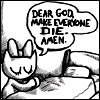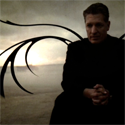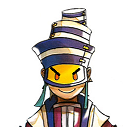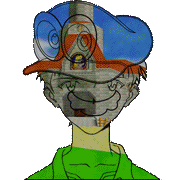|
ProSlayer posted:Lucy's apathetic response to her situation after spending her entire life as a self-sufficient, independent woman. David's "accepting his life" after living it as stubbornly as he did. I understand people change, but the character transformations in this book are unrealistic. She doesn't really accept it as I recall, she just doesn't want to talk about it with her father because he's a man and because she probably knows or senses that he himself is guilty of the kind of stuff that just happened to her (there's even a part of Lurie's internal monologue where he openly thinks about hooking up with his own daughter). She knows the police are useless so that's not an option. She was never really independent either, it's made clear that she doesn't have the harshness it takes to survive by herself at all, unlike Petrus. She's a throwback character from an earlier time whereas Petrus has a contemporary mindset, so she simply pretends it didn't happen and marries him because there's simply no other way for her to live.
|
|
|
|

|
| # ? Jun 5, 2024 02:23 |
|
Shibawanko posted:She doesn't really accept it as I recall, she just doesn't want to talk about it with her father because he's a man and because she probably knows or senses that he himself is guilty of the kind of stuff that just happened to her (there's even a part of Lurie's internal monologue where he openly thinks about hooking up with his own daughter). She knows the police are useless so that's not an option. She was never really independent either, it's made clear that she doesn't have the harshness it takes to survive by herself at all, unlike Petrus. She's a throwback character from an earlier time whereas Petrus has a contemporary mindset, so she simply pretends it didn't happen and marries him because there's simply no other way for her to live. I'm not talking about her dialogue with her father, or not contacting the police. She has the option to move away to Holland with her mother's side of the family, but chooses not to. I'm not expecting her to give up her way of life, but the idea that a woman in her position would choose to live in a situation with the threat of rape is absurd.
|
|
|
|
Haha, oh boy, here we go. 'Why doesn't she just move out if he beats her?!'
|
|
|
|
thehomemaster posted:Haha, oh boy, here we go. That's a false analogy.
|
|
|
|
ProSlayer posted:I'm not talking about her dialogue with her father, or not contacting the police. She has the option to move away to Holland with her mother's side of the family, but chooses not to. I'm not expecting her to give up her way of life, but the idea that a woman in her position would choose to live in a situation with the threat of rape is absurd. Well again, she's an old fashioned character with no real skills other than peasant farming. What would she do in Holland? She'd be safer but she'd also be dependent on her family and her father which to her is possibly worse than being dependent on Petrus. If she marries him the threat of rape is probably gone. He doesn't marry her for sex after all, but to turn her into a kind of slave.The whole point of the book is that the white characters' apparent idealism (David's Wordsworth and Byron obsession, Lucy's dream of off the grid farming and simple living) was something that could only exist in a sheltered, privileged situation under apartheid. The world outside of this is brutal and utilitarian and the characters have to find some way to live in this world, so they wager that by accepting the loss of almost everything they previously had and subjecting themselves to this world, they can shed the guilt of apartheid. What happens to Lucy is an ironic reversal of what happened earlier to David. David doesn't accept the school's overtures of a public confession and reinstatement, even though that would make his life easier, in the same way Lucy later refuses an escape to Holland. Both of them find themselves compelled to take the "hard way out" through some ethical impulse, with the difference that David doesn't really grasp what this actually means and thinks he can still live like some Byronic character, and Lucy understands that it means accepting that she will simply lose everything.
|
|
|
|
Shibawanko posted:Well again, she's an old fashioned character with no real skills other than peasant farming. What would she do in Holland? She'd be safer but she'd also be dependent on her family and her father which to her is possibly worse than being dependent on Petrus. If she marries him the threat of rape is probably gone. He doesn't marry her for sex after all, but to turn her into a kind of slave.The whole point of the book is that the white characters' apparent idealism (David's Wordsworth and Byron obsession, Lucy's dream of off the grid farming and simple living) was something that could only exist in a sheltered, privileged situation under apartheid. The world outside of this is brutal and utilitarian and the characters have to find some way to live in this world, so they wager that by accepting the loss of almost everything they previously had and subjecting themselves to this world, they can shed the guilt of apartheid. Everything that happens in the countryside is an ironic reversal. It's dope.
|
|
|
|
Shibawanko posted:Well again, she's an old fashioned character with no real skills other than peasant farming. What would she do in Holland? She'd be safer but she'd also be dependent on her family and her father which to her is possibly worse than being dependent on Petrus. If she marries him the threat of rape is probably gone. He doesn't marry her for sex after all, but to turn her into a kind of slave.The whole point of the book is that the white characters' apparent idealism (David's Wordsworth and Byron obsession, Lucy's dream of off the grid farming and simple living) was something that could only exist in a sheltered, privileged situation under apartheid. The world outside of this is brutal and utilitarian and the characters have to find some way to live in this world, so they wager that by accepting the loss of almost everything they previously had and subjecting themselves to this world, they can shed the guilt of apartheid. What you said does help me understand the point that the author was trying to get across. I can understand the literary merit in that interpretation of the book. With that said, I don't agree with it and don't consider it as realistic human emotion. I feel like the author is trying to make a point and shoe-horning his characters into it. I don't believe that the ethical impulse that you described happens in real life.
|
|
|
|
Beyond sane knolls posted:Everything that happens in the countryside is an ironic reversal. It's dope.
|
|
|
|
Also to beat a dead horse that book is partly what made me think about identity the way I talked about here earlier. What Lucy does is not really acquiring a new identity, dealing with identity, questioning identity and so on (which is what David does in his narcissism), but discarding identity. She intentionally reduces herself to animal life (Agamben's homo sacer) to be on parity with the black characters, who had to live like that all along, directly subject to the world's brutality, and to rid herself of the guilt of racial identity. In the end David's identity also disintegrates.
Shibawanko fucked around with this message at 23:31 on Aug 12, 2015 |
|
|
|
There's also the fact that swallowing injustice and tolerating intolerable conditions in order to have the hope of the life you want was very much the conditions apartheid placed on South African blacks. Its very much about the fundamental realities of being a minority power. Everything they face is a systemic reflection of what they benefited from under apartheid.
|
|
|
|
ProSlayer posted:What you said does help me understand the point that the author was trying to get across. I can understand the literary merit in that interpretation of the book. With that said, I don't agree with it and don't consider it as realistic human emotion. I feel like the author is trying to make a point and shoe-horning his characters into it. I don't believe that the ethical impulse that you described happens in real life. Why should book characters act like people in real life?
|
|
|
|
ProSlayer posted:What you said does help me understand the point that the author was trying to get across. I can understand the literary merit in that interpretation of the book. With that said, I don't agree with it and don't consider it as realistic human emotion. I feel like the author is trying to make a point and shoe-horning his characters into it. I don't believe that the ethical impulse that you described happens in real life. Look at the scene where he's interrogated by the school committee, the confrontation with unjust authority. I can easily imagine revolting against that sort of thing. It's just that the book shows that it's not enough to revolt from a position of pride or detachment by showing Lucy (who simply doesn't have a real choice, like I said, is going to Holland a real option?) doing a mirrored, more genuine version of it.
|
|
|
|
Antwan3K posted:Brave New World is one of the worst novels of all time ...are you on  or something? or something?
|
|
|
|
Has anyone read Mikhail Shishkin's Maidenhair? I tried to read it a few years ago for a book club, but couldn't make it past the first 50 pages or so. The first major part of the book is a transcript of a questioning between a refugee and an immigration office intepreter, and there's a point at which the refugee is making up a false story and the interpreter knows it's false and the reader knows it's false but it keeps going and going for like a hundred pages.... and I gave up somewhere in the middle of it, because I didn't see the point in investing myself in a story that everyone in and out of the book knows isn't true. I was so disappointed, too -- the reviews of the book had gotten me so hyped (like this one -- goddamn, don't you want to read that?!). But now, as I think about it years later, isn't that precisely the experience of reading any fiction? The author knows it isn't true, and you know it isn't true, but you invest yourself in the story anyway? So then, I'm thinking, maybe this is one of those Umberto Eco Name of the Rose situations, where the first 100 pages are devised as a test for the reader, an ordeal they must pass through in order to get to the good part on the other side. And THEN I thought, isn't that the experience of an asylum seeker in a nutshell? He must first go through an ordeal at the border of a new country before being allowed to enter and settle into his new home? And this was a brilliant way to begin the novel? So maybe I should quit being a loving child and pick up that book again?? Thoughts???
|
|
|
|
A human heart posted:Why should book characters act like people in real life? Because its the definition of plausibility. I am not sure I would so much say characters should act like people in real life, but that they must at least react realistically to the environment they inhabit. I thought the characters in Disgrace acted very plausibly.
|
|
|
|
A human heart posted:Why should book characters act like people in real life? They shouldn't act like "people" (in general), but they should act like the person they've been presented as being. It doesn't matter if they act like I the reader would act, but if they are presented as having a particular history/personality/motivation and then, for no discernable reason, they act contrary to that, I'm going to think the author made a big mistake. E: Or at least feel really confused and then frustrated when I can't figure out WTF is going on with this character. This was my problem with Aglaya in Dostoevsky's The Idiot -- her behavior was most often completely incomprehensible to me, and I still don't know what Dostoevsky's intentions were for making her behave the way she did. Unless she was supposed to be the embodiment of sexist caricatures of women as moody, fickle, and completely incomprehensible. Rabbit Hill fucked around with this message at 18:02 on Aug 13, 2015 |
|
|
|
Rabbit Hill posted:E: Or at least feel really confused and then frustrated when I can't figure out WTF is going on with this character. This was my problem with Aglaya in Dostoevsky's The Idiot -- her behavior was most often completely incomprehensible to me, and I still don't know what Dostoevsky's intentions were for making her behave the way she did. Unless she was supposed to be the embodiment of sexist caricatures of women as moody, fickle, and completely incomprehensible. It's been years, so this might be really loving off, but wasn't part of it that she couldn't really open up in any way to Myshkin because of his stupid obsession with Nastassya?
|
|
|
|
Ya, Algaya was supposed to be the "Rational" choice, but she has to actually be a realistic character with reasonable demands and Mushkin keeps pushing her away in his crazy quest to redeem Nastasya which she Does Not Apperciate, along with his constant gently caress-ups in social situations She's meant to illustrate the madness of love, I reckon
|
|
|
|
she seemed childish, in a negative way as a complement to myshkin being childlike in a more positive way.
|
|
|
|
I just finished Between the World and Me and I'm not exactly sure how I feel. Having read a few articles by Coats before I wasn't expecting the prose to be so poetic in nature, I was thinking it would be more of a societal accounting than a biography, but after the surprise wore off I found myself glad that he took this approach to telling his story. While the attempt at life sprawling poetry, with the word cosmic and synonyms for cosmic thrown around a good bit, felt forced at times I absolutely loved his use of "bodies" as an expression of life/self/power for how it reinforced the way black American life can be forced into an absolute focus on the material world. That had more emotional impact on me than an accounting of the facts ever could. Coates also did a great job of showing instead of telling the evolution on his societal philosophy by stating with conviction the world view of his younger days only to dictate how teachers, friends, life, or experience would morph those thoughts later on. Between the World and Me is filled with things that help the book build upon itself. Framing the story as a message to his son only emphasizes the ever present fear that he has for his son, that he must be taught the workings of this racist world or his life is forfeit. It's weird to try and talk about this book without addressing the issues of African American life with which it deals but I recognize that this isn't really the place for those kinds of discussions. However, I would be remiss if I didn't say how attacked I felt at points while reading this book as a young white man of relative privilege. Hell, maybe me more so than most as I grew up 12 miles and a world away from where the author went through his own violent childhood. I'm not saying that Coates was wrong or even overly aggressive in his assessment of the modern "white" world's responsibility for the atrocities of today and of old. It's just that it can be really hard to hear that in the daily routine of pursuing your life and trying to be decent to the world around you are contributing to a history and present of such repulsive racism. Even though I'm a person who is receptive to the ideas that the modern world is built on the blood of innocents and those victims more often than not have dark skin, it's hard to hear about your action/inaction coloring a person's hatred for the world. Probably something that someone in my position needs to hear more often. Yeah, y'all need to read this book.
|
|
|
|
inspector glebsky's puzzle
|
|
|
|
The Puppy Bowl posted:I just finished Between the World and Me and I'm not exactly sure how I feel. Having read a few articles by Coats before I wasn't expecting the prose to be so poetic in nature, I was thinking it would be more of a societal accounting than a biography, but after the surprise wore off I found myself glad that he took this approach to telling his story. While the attempt at life sprawling poetry, with the word cosmic and synonyms for cosmic thrown around a good bit, felt forced at times I absolutely loved his use of "bodies" as an expression of life/self/power for how it reinforced the way black American life can be forced into an absolute focus on the material world. That had more emotional impact on me than an accounting of the facts ever could. Coates also did a great job of showing instead of telling the evolution on his societal philosophy by stating with conviction the world view of his younger days only to dictate how teachers, friends, life, or experience would morph those thoughts later on. Between the World and Me is filled with things that help the book build upon itself. Framing the story as a message to his son only emphasizes the ever present fear that he has for his son, that he must be taught the workings of this racist world or his life is forfeit. Go post in the book club about it yo
|
|
|
|
Rabbit Hill posted:
??? Name of the Rose is interesting within the first few pages though?
|
|
|
|
Zesty Mordant posted:??? I had to read that whole book in three days when I was in high school. That kind of made me hate the book, especially when a lot of the religious discussions seemed like pointless diversions at the time, though looking back I'm able to sort of see what Eco was going for. I still have my copy- maybe I'll read it again someday. I'd imagine it's the kind of novel that's more enjoyed while taken slowly.
|
|
|
Zesty Mordant posted:???
|
|
|
|
|
Raxivace posted:I had to read that whole book in three days when I was in high school. I'd not have wanted to read it in three days either, no. But within the first twenty pages you have not only the 'setup' of the text being a found document, which is cool, but also Brother William shows up and drops knowledge about the missing horse. I was in to it as soon as it became clear it was going to be a kind of 'Holmes in pre-scientific Europe' story. The religious discussions are cool too, if a little tedious, because it really makes it clear that the premise isn't a weak gimmick and Eco knows what he's doing. At least it seems so, I'm not a medieval scholar. I haven't read Foucault's Pendulum so I can't comment.
|
|
|
|
anilEhilated posted:Foucault's Pendulum would probably be the better example. Foucault's Pendulum has a pretty strong start really, you're told that a dude has probably maybe been kidnapped and the narrator is convinced that the same people are after him, that's a pretty immediate hook.
|
|
|
|
The door section of Name of the Rose is specifically called out as a "test" to the reader in like the forward since it is a several dozen page semiotics parlor trick, that is probably what is being referenced.
|
|
|
|
Baudolino opens with some 20 pages of mangled dog latin or something, so that might be it, too.
|
|
|
Tree Goat posted:The door section of Name of the Rose is specifically called out as a "test" to the reader in like the forward since it is a several dozen page semiotics parlor trick, that is probably what is being referenced.
|
|
|
|
|
yeah i found the opening of Baudolino to be almost unbearable, but that section is pretty short. the rest of the book was pretty good i thought though it seemed to increase in silliness maybe too much towards the end
|
|
|
|
I hope I haven't spoiled myself on Calvino after starting out with Invisible Cities and following up with If on a winter's night a traveler. I got Castle of Crossed Destinies because it looked interesting. I also got the Borges collection Labyrinths and I've never read Borges. this is all to have short things to trade off while I read Lolita. I decided to go with something shorter to start with russian lit (does it even count?) even though I found a copy of C&P (Monas translation, dunno if that's a good one) at one of those book hutch things in nice neighborhoods. I just get the feeling that diving right in with Dead Souls or something is going to be incomprehensible.
|
|
|
|
Zesty Mordant posted:I hope I haven't spoiled myself on Calvino after starting out with Invisible Cities and following up with If on a winter's night a traveler. I got Castle of Crossed Destinies because it looked interesting. I also got the Borges collection Labyrinths and I've never read Borges. this is all to have short things to trade off while I read Lolita. I decided to go with something shorter to start with russian lit (does it even count?) even though I found a copy of C&P (Monas translation, dunno if that's a good one) at one of those book hutch things in nice neighborhoods. I just get the feeling that diving right in with Dead Souls or something is going to be incomprehensible. nabokov isn't very russian imo gogol really is a good starting point for russian lit, if that's what you're asking - otherwise bulgakov owns bones and is quite short for that country i am regrettably light on turgenev, but i hear he's also a fairly good starting point
|
|
|
|
dead souls isn't remotely heavy in any sense of the word, it's a farce
|
|
|
|
right but a farce of Russian society and status quo of the time, which doesn't exactly sound relatable or enticing but I guess if it's still good it's still good. Master and Margarita was what I was weighing it against anyway so I'll just throw a dart and start at one of those once I finish what I've got
|
|
|
|
they are both good imo, dead souls i think is a little more "even" than m&m i recommend oblomov also because the protagonist reflects the hikikomori lifestyle that we all should treasure
|
|
|
|
here lies trigorin: he was a good author, but turgenev was better really good line, chekhov also owns
|
|
|
|
Ras Het posted:dead souls isn't remotely heavy in any sense of the word, it's a farce Hey now Ornstein and Smough are pretty tough but lets not be melodramatic
|
|
|
|
the death of ivan ilyich is a good, short starting point for russian lit as well imo, but I also second bulgakov
|
|
|
|

|
| # ? Jun 5, 2024 02:23 |
|
Zesty Mordant posted:I also got the Borges collection Labyrinths and I've never read Borges. Yes! Yes!!!!!!
|
|
|


























